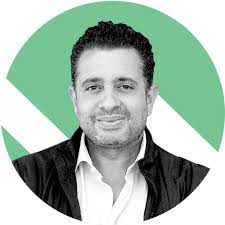THE NEXT SOCIETY #NOWANDLIVE
INTERVIEW WITH KARIM SAMRA, CEO and Founder of Changelabs in Egypt on Energy Transition.
In line with the objective to share relevant experiences and promote best practices in the EU-Med innovative sectors, FEMISE conducted a series of interviews with key players from the region, including policy makers, private sector, civil society, academia and entrepreneurs, in the context of the NEXT SOCIETY project with the support of ANIMA and the financial support of the European Union. The main objective of this series of interviews is to bring forward the experience of key players in the region on how to promote innovation within key sectors and to highlight issues related to the challenges these sectors are facing, the types of policy support that are needed and some of the national initiatives that have been taking place.
This series will tackle the health tech, energy, green tech, education and e-commerce sectors and will bring you experts from across the region including: Morocco, Egypt and Lebanon.
This interview in “THE NEXT SOCIETY: NOW AND LIVE!” series is with Mr. Karim Samra, CEO and Founder of Changelabs in Egypt. Mr Samra shares his knowledge and experiences of best practices in the Energy sector, providing examples from Egypt.
Context
As the driving force of economic and industrial growth, the energy sector plays a key role to foster prosperity and social development. However, the persistent increase in energy demands, due to economic progress, urbanization and population growth in the South med region, together with shortages and increasing energy prices are calling for an urgent transition towards renewable energy sources.
In Egypt, in response to severe energy shortage, a number of national initiatives and new investments have been taking place to meet this increasing demand for renewable “toaenergy while mitigating the impact on climate. At the same time, this has created a window of opportunity for young entrepreneurs to enter the energy market with innovative solutions for their start-ups.
In this interview, Mr. Karim Samra is answering our questions on how the “Scale Up to Green Program” stimulates entrepreneurship in the Energy sector and witnesses the sector’s value chain transformation from Policy to Practice:
- What is the objective of the “Scale Up to Green Program”, and which organizations at the national level are taking part?
- What are the main challenges faced by Egyptian entrepreneurs and how the “Scale Up to Green Program” has helped them in the different phases of their projects?
- What are the impact and the main outcomes of this program on the Egyptian Scale Up ecosystem?
To watch the whole #NOWANDLIVE interview (click on the youtube below or click here)
About Mr. Karim Samra
 Mr. Karim Samra holds a B.A. in History from Boston College and an M.B.A. from NYU’s Stern School of Business, where he was a merit-based scholarship recipient. He launched Changelabs, a dedicated platform for the Middle East to make sure as many young people as possible could receive training, inspiration and funding for early stage startups. He introduced ‘Scale Up to Green’ accelerator which is one of the leading impact-centred accelerators primarily focused in Egypt and operating in MENA. The programme is targeting Egyptian resource efficiency, green energy, and agritech companies and aims to help SMEs and scale ups build the right long term partnerships, raise additional rounds of funding and access to the resources they need to scale, and acquire more customers.
Mr. Karim Samra holds a B.A. in History from Boston College and an M.B.A. from NYU’s Stern School of Business, where he was a merit-based scholarship recipient. He launched Changelabs, a dedicated platform for the Middle East to make sure as many young people as possible could receive training, inspiration and funding for early stage startups. He introduced ‘Scale Up to Green’ accelerator which is one of the leading impact-centred accelerators primarily focused in Egypt and operating in MENA. The programme is targeting Egyptian resource efficiency, green energy, and agritech companies and aims to help SMEs and scale ups build the right long term partnerships, raise additional rounds of funding and access to the resources they need to scale, and acquire more customers.
THE NEXT SOCIETY #NOWANDLIVE are organised by FEMISE and ANIMA with the financial support of the European Union.
For more details about this series of THE NEXT SOCIETY #NOWANDLIVE click here



